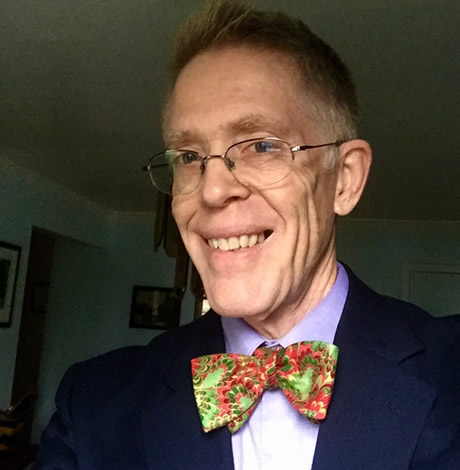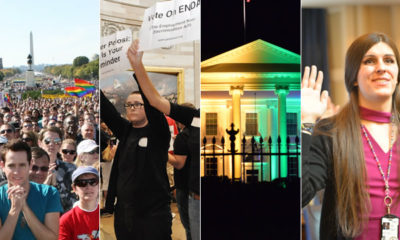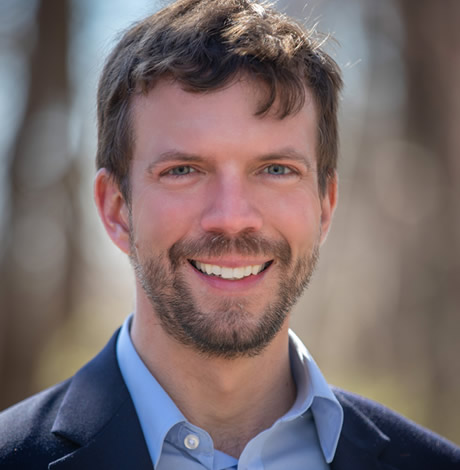Local
Lawmakers hail introduction of Md. marriage bill
Vote in Senate expected in February
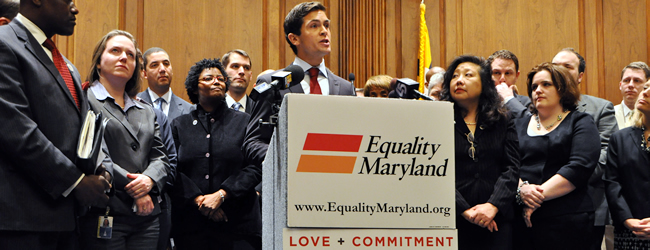
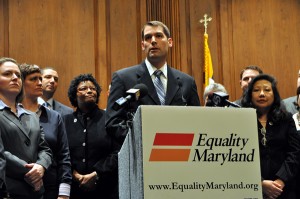
Maryland Sen. Rob Garagiola at the podium. State Del. Mary Washington is to his right. (Blade photo by Michael Key)
Members of the Maryland Legislature joined LGBT activists at a news conference at the state capitol in Annapolis Tuesday to formally launch a campaign to pass a same-sex marriage bill that backers introduced the previous week.
The Religious Freedom and Civil Marriage Protection Act is expected to come up for a committee hearing in the State Senate the first week of February and likely will be sent to the Senate floor for debate and a vote as soon as Feb. 7, according to sources familiar with the measure.
Political insiders have said they believe supporters have the votes this year to pass the measure in the Senate, where it has died in committee in past years. And sources claim the House has had the necessary votes for some time to pass it.
“I am very proud to be a sponsor of this legislation,” said House of Delegates Majority Leader Kumar Barve (D-Mont. County), who holds the No. 2 leadership position in that body. “This bill is a testament to what it means to be an American and what it means to be free and equal in our society.”
Barve was one of more than 25 lawmakers and LGBT advocates and their supporters who attended the Jan. 25 news conference in Annapolis.
Sen. Rob Garagiola (D-Mont. County), the Senate Majority Leader and a sponsor of the marriage bill, told the gathering that gay and straight couples are “no different” in their capacity to love one another.
“It’s time that the rights already enjoyed by many who can obtain a marriage license in Maryland are enjoyed by all regardless of gender and sexual orientation,” he said.
The official registry of bills on the Maryland Legislature’s website shows that the Religious Freedom and Civil Marriage Protection Act was introduced in the House of Delegates on Jan. 20 with 17 sponsors and referred to the Committee on the Judiciary.
The registry shows that the marriage bill was introduced in the Senate on Jan. 21 with 18 sponsors, including Garagiola and Richard Madaleno (D-Montgomery County), who is gay. It was sent to the Senate Judicial Proceedings Committee.
Morgan Meneses-Sheets, executive director of the statewide LGBT group Equality Maryland, the lead advocate for the bill, said another copy of the identical bill was introduced in the House of Delegates Tuesday with 56 sponsors, including Barve, whose name was not on the first House bill introduced last week.
“This is the bill we will be pushing,” she said. “It’s very common to introduce more than one bill. It happens all the time.”
The two-page bill calls for amending the state’s family law, which currently says, “Only a marriage between a man and a woman is valid in this state.” The new language in the Religious Freedom and Civil Marriage Protection Act would rewrite that provision to state, “Only a marriage between two individuals who are not otherwise prohibited from marrying is valid in this state.”
A second provision in the bill states that “an official of a religious institution or body authorized to solemnize marriages may not be required to solemnize any marriage in violation of the right to free exercise of religion guaranteed by the First Amendment to the United States Constitution and by the Maryland Constitution and Maryland Declaration of Rights.”
Backers say the latter provision, which is similar to a provision in D.C.’s same-sex marriage law, is aimed at assuring religious leaders that churches and other faith-based institutions cannot be forced to perform same-sex marriages.
Equality Maryland and the national same-sex marriage advocacy group Freedom to Marry jointly sponsored the Tuesday news conference.
Officials with both groups said they were hopeful that growing support for same-sex marriage in the state, as reflected in public opinion polls, would help supporters beat back a well-funded opposition campaign by the National Organization for Marriage (NOM) to defeat the bill.
NOM President Brian Brown said the group would immediately file a petition to bring a same-sex marriage bill before voters in a referendum if the legislature passes it and Gov. Martin O’Malley signs it. O’Malley, a Democrat, has said he would sign the bill if the legislature passes it.
A statewide poll commissioned by the Washington Post and released this week shows that 51 percent of Maryland voters favor a law allowing same-sex couples to marry, while 44 percent oppose such a law. Five percent had no response on the issue.
The same poll showed O’Malley had a job approval rating 58 percent, the highest approval he’s had since becoming governor, according to the Post. Thirty percent of those polled disapprove of O’Malley’s job performance and 13 percent were not sure, the poll shows.
Although O’Malley’s stated commitment to sign a marriage bill has been widely reported in the media, the high approval rating hasn’t changed his decision not to take an active role in lobbying for the marriage bill.
And in a related development, O’Malley released his legislative agenda for the 2011 session of the legislature that includes at least 15 bills addressing a variety of issues, including healthcare, gun control, child welfare and promotion of electric vehicles.
Missing from O’Malley’s legislative agenda are the marriage bill and a separate bill expected to be introduced this year to ban employment discrimination against transgender residents.
Asked why O’Malley didn’t include the marriage and transgender bills in his agenda list, his press secretary, Shaun Adamec, said in an e-mail that the governor includes only those bills he introduces himself in his agenda list. Adamec said O’Malley supports additional bills that members of the legislature introduce and that he fully supports and plans to sign both the marriage bill and transgender rights bill.
“The Governor has been very clear that achieving equity for all Marylanders continues to be a priority of his,” Adamec said.
“We are here today as part of a growing movement across the country toward fairness and respect for all families,” said Sean Eldridge, political director of Freedom to Marry, at Tuesday’s news conference.
“Same-sex couples are now free to marry in five states and next door in the District of Columbia, as well as a dozen countries worldwide,” he said. “And in each of these places, the sky has not fallen, and families have been helped, with no one hurt. Because there is no good reason to continue excluding same-sex couples from marriage, Freedom to Marry supports the work of our Maryland partners to pass the Religious Freedom and Civil Marriage Protection Act,” he said.
“Make no doubt about it – Maryland is ready for marriage equality, and we will not stop until it is no longer denied to our families,” said Del. Heather Mizeur (D-Montgomery County), one of five lesbian members of the House of Delegates.
District of Columbia
Taste of Pride serves community, cuisine ahead of WorldPride
Capital Pride Alliance partners with local restaurants to celebrate LGBTQ culture, support small businesses, and raise funds for the Pride365 Fund.

With WorldPride set to kick off next month, bringing an estimated two million visitors to D.C., the city’s LGBTQ and restaurant communities are preparing for an unprecedented celebration.
Capital Pride Alliance, the nonprofit organization behind D.C.’s Pride events, is uniting the city’s LGBTQ and culinary communities to raise money for the Pride365 Fund through a program called Taste of Pride.
Taste of Pride partners with local restaurants across the District to generate funds for the Pride365 Fund, which, in turn, supports local LGBTQ organizations.
The Washington Blade sat down with Brandon Bayton, Special Projects & Influencer Manager for Capital Pride, to discuss how Taste of Pride is giving everyone the chance to support the LGBTQ community while enjoying incredible local cuisine.
“D.C. has become really known as sort of a foodie city,” said Bayton. “The restaurants that are participating are really stepping up to show their support for the LGBTQ community-especially in these troubling times right now. For them to step up and say, ‘Hey, we support you,’ it’s an opportunity for us to share them with our community and say, ‘We can support you too.’”
For Bayton, who is also the lead planner and producer for Taste of Pride, these restaurants’ open commitment to being safe spaces for the LGBTQ community serves three key purposes. The first is that they create a sense of belonging.
“By these restaurants participating, there is visibility,” he said. “They’re saying the LGBTQ community is here. They are patrons. We respect them and we support them. That, first and foremost, is one.” The participating restaurants are also given a sticker to display in their window that proves they are an official restaurant of Taste of Pride.
The second key aspect, Bayton explained, is that these restaurants are financially supporting an organization that directly benefits Washington’s LGBTQ community. To participate, restaurants must contribute at least $250 to Capital Pride, which serves as a donation to the Pride365 Fund.
“These restaurants are supporting us financially too,” Bayton said. “They are pretty much donating. There are tiers, and those tiers are donations to the Pride365 Fund-which is Capital Pride’s fundraising arm. That fund supports not just Capital Pride, but our sister organizations too, where we do grants and loans. We can disperse funds to SMYAL or the DC LGBTQ Center. Some of the funds that we’ve been raising go into the completion of the LGBTQ Center. It’s a fund that really supports the community.”
Lastly, Taste of Pride provides a platform for restaurants to showcase not only their food but also the queer history of their neighborhoods.
“The third thing is some of these restaurants are doing actual events, from drag events to poetry readings and hosting artists,” Bayton said. “Annie’s is a participant that’s going to be part of the Dupont Circle/17th Street Taste of Pride weekend in June, and they’re hosting a book launch for an author. His name is Erik Piepenburg, and he has featured Annie’s and other LGBTQ establishments in his book, “Dining Out.” The Watergate [Hotel] has four events that they’re doing. The Union Market community is doing special events for its Taste of Pride. It has been a win-win for everyone.”
So far, Taste of Pride has hosted two events: a kickoff event at Hook Hall and a weekend event with the Georgetown Business Improvement District (BID). If those events were any indication, Bayton said, this year’s Taste of Pride is shaping up to be both delicious and fabulous.
“We had a great panel of chefs,” he said about the January kickoff party. “We had David Hagedorn, Rob Heim from Shaw’s Tavern, these guys who call themselves Pirate Ventures. And we had Chef Angela Rose, who not only is a member of the [LGBTQ] community but also leads the Go-Go Museum’s café.”
The event also showcased two local drag artists.
“We had two performers-Frieda Poussáy and Dior Couture, a definite rising star in D.C. It was a night of food, camaraderie, networking, and friends getting together. It was a nice community event.”
Taste of Pride will continue throughout the city, with different Business Improvement Districts (BIDs) hosting culinary-focused weekends from now until July 31. Participating neighborhoods include NoMa, Dupont Circle, Golden Triangle, Capitol Hill, the Capitol Riverfront, and more.
This weekend, Adams Morgan will take center stage, serving up its own Taste of Pride. From the famous pupusas at El Tamarindo to the juicy burgers at Lucky Buns, these iconic and top-rated AdMo restaurants will not only be selling delicious food and raising money for the LGBTQ community, but they’ll also be “sharing a story — one of diversity, inclusion, and Pride.”
When asked how people should get involved in the Taste of Pride events, Bayton explained that Capital Pride found an app to “try to take the heavy lifting off of the restaurants by creating a specialized portal and employing an app.”
“One of the things is to download your Bandwango pass, because that gives you access to all the neighborhood groups as they come online,” he said.
Additionally, Bayton said posting a photo on social media is a great way to bring awareness to local restaurants supporting the LGBTQ community.
“When you go into the restaurants, take a picture, tag them, show your support for them,” he said.
This is not the first year Taste of Pride has taken place, Bayton told the Blade. It began in 2021 to support struggling local businesses during the COVID-19 pandemic but has since evolved into what it is today.
Bayton also shared his hopes for the future of Taste of Pride and for it to be recognized as much as a foodie event as a fundraising opportunity.
“My vision for Taste of Pride is that it becomes a staple of Capital Pride, not just something we do around Pride weekend. It becomes something that is ongoing. I would like to see it grow to become a major event, similar to the Pink Tie Party or Chefs for Equality, but always with the goal of interacting with the community and the allies of our community.”
That goal, he said, is impossible to achieve without food.
“I think we connect over food,” Bayton said. “When people sit down and they have dinner, it’s that time that provides an opportunity to allow us to connect with one another. Food serves as a key bridge.”
District of Columbia
D.C.-area schools to protest Trump’s ‘assault on public education’
Students unite against Trump’s education cuts in unprecedented protest

Student government leaders from multiple D.C.-area schools are coming together to protest recent Trump administration actions aimed at restricting student rights in America.
On Friday, April 4, at 4 p.m., the student governments of Georgetown, George Washington, Howard, American, George Mason, and Temple plan to protest the Trump-Vance administration’s efforts to dismantle public education at the Department of Education building (400 Maryland Ave., S.W.), just south of the National Mall. This “unprecedented coalition” of higher education student governments in the D.C.-Maryland-Virginia region, representing 130,000 students, will gather to tell the administration to keep its “Hands Off Our Schools.”
In a statement emailed to the Washington Blade, Asher Maxwell, press coordinator for the Georgetown University Student Association, called this a “historic coalition” and said the protest will highlight how Trump’s policies—dismantling the Department of Education, eradicating DEI initiatives, eliminating funding for academic programs and financial aid, and silencing student voices—are affecting students.
Former middle school principal and U.S. Rep. Jamaal Bowman of New York, along with campus free speech advocate Mary Beth Tinker, known for her role in Tinker v. Des Moines, are slated to speak at the rally about the importance of public education and free speech amid what they call the administration’s disregard for the rule of law and constitutionally protected acts such as protesting and speaking out against the government.
The rally is expected to draw thousands of students, from college to kindergarten, as well as First Amendment supporters and those angered by the administration’s efforts to minimize the federal government. Since taking office, Trump has laid off tens of thousands of federal employees, including many within the Department of Education, as he and his senior adviser, Elon Musk, strip away protections and federal spending that disproportionately affect LGBTQ people, people of color, and students.
The Washington Blade reached out to the White House for comment but has not received a response.
District of Columbia
D.C. police investigating anti-gay assault in Shaw
Police say suspect punched victim in face after shouting ‘homophobic slurs’

D.C. police are investigating a March 7, 2025, assault case listed as a suspected hate crime in which an unidentified male suspect punched a man in the face on the sidewalk outside an apartment building after calling the victim and his male friend “faggots.”
The victim, Destin Karol, and his friend, Ian Dotson, both residents of Arlington, Va., told the Washington Blade the assault took place about 10 p.m. while they were walking along 7th Street, N.W. on their way to the Shaw-Howard University Metro station.
The two men said while walking in front of the upscale 7th Flats apartment building at 1825 7th St., N.W., they saw the male suspect and a woman he was with get out of a car parked in front of the building. Seconds later, they saw the woman vomiting on the sidewalk as they walked past her, the two men told the Blade.
At that time, the male suspect yelled, “What are you looking at, faggots,” Karol and Dotson told the Blade. The suspect then punched Karol in the face “several times,” according to a D.C. police report.
Karol said he was diagnosed the next day at a hospital in Arlington near his home with a broken jaw that required the jaw to be wired shut.
Dotson said D.C. police arrived on the scene after he called 911 after witnessing the suspect punching Karol, knocking him down and kicking Karol in the face while he was lying on the sidewalk.
Karol said an ambulance arrived on the scene and paramedics treated his facial injury with an ice pack and offered to take him to the hospital. He said he declined the offer, choosing to go home first. But upon experiencing intense pain the next day, he visited a medical clinic whose doctors told him to immediately go to the nearby hospital emergency room.
An initial version of the D.C. police incident report did not list the incident as a suspected hate crime. But a revised version of the report, which was issued after the Blade contacted police to ask about the earlier report, classifies the incident as a “suspected hate crime.”
The revised report states that the suspect, after telling the victim, “What are you looking at,” proceeded to “close fist strike Victim 1 in the left jaw area several times.” It says Subject 2, who was Dotson, told police the suspect “yelled out homophobic slurs.”
The report concludes by saying, Suspect 1 “was last seen heading inside 1825 7th Street, N.W.”
According to Karol, police so far have not changed the report, at Karol’s request, to list the incident as an ‘aggravated assault’ rather than its current listing as a “simple assault.” Karol points out that under police policy, an assault-related injury that causes a broken bone should be classified as an aggravated assault.
Karol and Dotson said the police report also does not mention that they told the two police officers who arrived on the scene that they saw the suspect and the woman he was with get out of a car and they showed the two officers which car it was as it was parked in front of the apartment building.
Karol told the Blade he and Dotson asked at least one of the officers to take down the license plate number of the car, but the officer said it was not necessary for him to do so. Dotson said he recalls that the car was a white, 4-door Volkswagen hatchback with a Virginia license plate.
Dotson said he and Karol were disappointed that the police did not appear to take down the license number and he regrets that he did not write it down himself. But he said he recalls that the Virginia license tag consisted of all letters and no numbers, with the letters “IN” as part of it.
He described the suspect as a white male appearing to be between 35 or 45 years old with brown hair and a goatee or beard.
D.C. police spokesperson Paris Lewbel said a Third District police detective has been assigned to the case and the case remains under active investigation. He said he could not comment on the issues raised by Karol and Dotson under a police policy of not disclosing specific details in an ongoing investigation.
Karol said he has been speaking with Detective Wilson, whose first name he does not recall, and said he most recently spoke with her on Tuesday, April 1. “They’re trying to get the license plate of this individual and they’re trying to get the camera footage from the apartment building and the adjacent buildings,” Karol said the detective told him.
Dotson said at the time the police arrived on the scene on the night of March 7, an employee from the 7th Flat apartment building who identified himself as the concierge came out of the building and told one of the police officers that he saw the male suspect and the woman he was with enter the building.
Police spokesperson Lewbel said he could not disclose whether the concierge was able to help police identify the suspect under the policy of not disclosing details of an ongoing investigation.
Police urge members of the public who may have witnessed an incident like this or who may know something about it, including the identity of a suspect, to call the police information line of 202-727-9099.
-

 Movies3 days ago
Movies3 days agoSexy small town secrets surface in twisty French ‘Misericordia’
-

 The White House2 days ago
The White House2 days agoUSCIS announces it now only recognizes ‘two biological sexes’
-

 Federal Government4 days ago
Federal Government4 days agoMass HHS layoffs include HIV/AIDS prevention, policy teams
-

 Arts & Entertainment5 days ago
Arts & Entertainment5 days ago‘Think of those who have not been seen,’ Cynthia Erivo’s powerful message at GLAAD Awards

